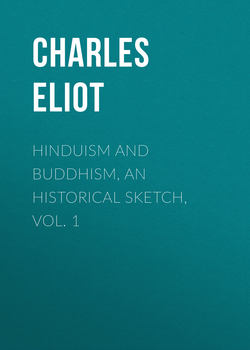Читать книгу Hinduism and Buddhism, An Historical Sketch, Vol. 1 - Charles Eliot - Страница 16
BOOK I
INTRODUCTION
16. The Extravagance of Hinduism
ОглавлениеWhat I have just said applies to India rather than to China and so do the observations which follow. India is the most religious country in the world. The percentage of people who literally make religion their chief business, who sacrifice to it money and life itself (for religious suicide is not extinct), is far greater than elsewhere. Russia61 probably comes next but the other nations fall behind by a long interval. Matter of fact respectable people—Chinese as well as Europeans—call this attitude extravagance and it sometimes deserves the name, for since there is no one creed or criterion in India, all sorts of aboriginal or decadent superstitions command the respect due to the name of religion.
This extravagance is both intellectual and moral. No story is too extraordinary to be told of Hindu gods. They are the magicians of the universe who sport with the forces of nature as easily as a conjuror in a bazaar does tricks with a handful of balls. But though the average Hindu would be shocked to hear the Puranas described as idle tales, yet he does not make his creed depend on their accuracy, as many in Europe make Christianity depend on miracles. The value of truth in religion is rated higher in India than in Europe but it is not historical truth. The Hindu approaches his sacred literature somewhat in the spirit in which we approach Milton and Dante. The beauty and value of such poems is clear. The question whether they are accurate reports of facts seems irrelevant. Hindus believe in progressive revelation. Many Tantras and Vishnuite works profess to be better suited to the present age than the Vedas, and innumerable treatises in the vernacular are commonly accepted as scripture.
Scriptures in India62 are thought of as words not writings. It is the sacred sound not a sacred book which is venerated. They are learnt by oral transmission and it is rare to see a book used in religious services. Diagrams accompanied by letters and a few words are credited with magical powers, but still tantric spells are things to be recited rather than written. This view of scripture makes the hearer uncritical. The ordinary layman hears parts of a sacred book recited and probably admires what he understands, but he has no means of judging of a book as a whole, especially of its coherency and consistency.
The moral extravagance of Hinduism is more serious. It is kept in check by the general conviction that asceticism, or at least temperance, charity and self-effacement are the indispensable outward signs of religion, but still among the great religions of the world there is none which countenances so many hysterical, immoral and cruel rites. A literary example will illustrate the position. It is taken from the drama Mâdhava and Mâlatî written about 730 A.D., but the incidents of the plot might happen in any native state to-day, if European supervision were removed. In it Mâdhava, a young Brahman, surprises a priest of the goddess Châmundâ who is about to immolate Mâlatî. He kills the priest and apparently the other characters consider his conduct natural and not sacrilegious. But it is not suggested that either the police or any ecclesiastical authority ought to prevent human sacrifices, and the reason why Mâdhava was able to save his beloved from death was that he had gone to the uncanny spot where such rites were performed to make an offering of human flesh to demons.
In Buddhism religion and the moral law are identified, but not in Hinduism. Brahmanical literature contains beautiful moral sayings, especially about unselfishness and self-restraint, but the greatest popular gods such as Vishnu and Śiva are not identified with the moral law. They are super-moral and the God of philosophy, who is all things, is also above good and evil. The aim of the philosophic saint is not so much to choose the good and eschew evil as to draw nearer to God by rising above both.
Indian literature as a whole has a strong ethical and didactic flavour, yet the great philosophic and religious systems concern themselves little with ethics. They discuss the nature of the external world and other metaphysical questions which seem to us hardly religious: they clearly feel a peculiar interest in defining the relation of the soul to God, but they rarely ask why should I be good or what is the sanction of morality. They are concerned less with sin than with ignorance: virtue is indispensable, but without knowledge it is useless.
61
And in Russia there are sects which prescribe castration and suicide.
62
This, of course, does not apply to Buddhism in China, Japan and Tibet.
